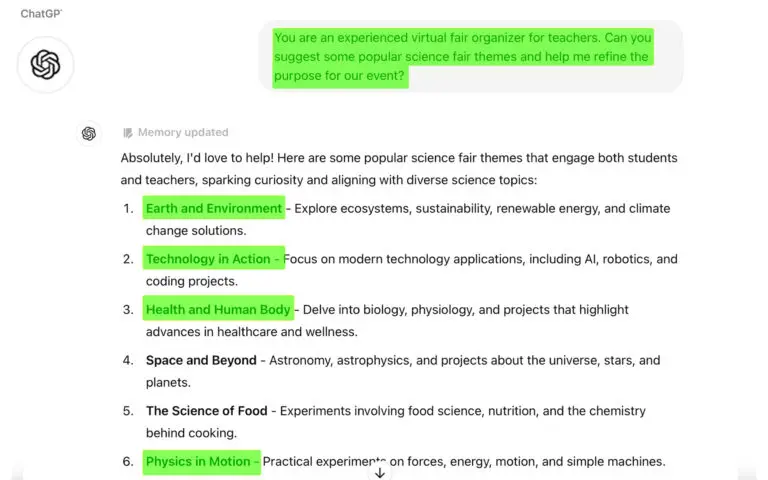Improving vocabulary is a cornerstone of academic success for students. A strong vocabulary not only enhances communication skills but also improves reading comprehension, critical thinking, and writing ability. Educators face the challenge of finding creative ways to teach vocabulary that are engaging, memorable, and practical for real-world use. Prompts are a fantastic way to spark curiosity, encourage deeper learning, and help students make meaningful connections with new words.
In this article, I’ll explore 5 effective vocabulary prompts to help improve student vocabulary while keeping your lessons engaging and impactful.
Download free copy here: AI Vocabulary Prompt Template
1. Prompt: “How can you connect the [topic or word] to real-life scenarios?”
Why It’s Helpful:
This prompt helps teachers brainstorm relatable activities that tie [topics or words] to students’ daily lives, making the learning process meaningful.
Example Using the Word “Empathy”:
• Ask students to write a journal entry describing how they showed “empathy” during a recent interaction.
• Assign a task where students observe and explain examples of “empathy” in their favorite TV shows or books.
Why It Works:
By applying [topics or words] like “empathy” to tangible situations, students grasp their meanings while seeing their relevance in the real world.
2. Prompt: “What classroom activities can make the [topic or word] fun and interactive?”
Why It’s Encouraging:
This prompt encourages teachers to design engaging, hands-on activities for vocabulary practice, sparking creativity in the classroom.
Example Using the Word “Resilient”:
• Organize a role-play activity where students act out scenarios demonstrating “resilience,” such as overcoming challenges in sports or academics.
• Create a group project where students write a short play titled The Resilient Hero and incorporate synonyms like “determined” and “tenacious.”
Why It Works:
Interactive activities turn abstract [topics or words] into lived experiences, reinforcing vocabulary through play and teamwork.
3. Prompt: “What technology tools can enhance the teaching of this [topic or word]?”
Why It’s a Winner:
This prompt encourages exploration of digital tools that make vocabulary learning interactive and personalized.
Example Using the Topic “Environmental Science”:
• Use apps like Quizlet to create flashcards for terms like “biodiversity,” “ecosystem,” and “sustainability.”
• Have students use Canva to design digital posters explaining the concept of “climate change” and its vocabulary.
Why It Works:
Technology makes learning accessible and engaging, especially for digital-native students, and helps visualize complex [topics or words] like “ecosystem.”
4. Prompt: “How can writing assignments reinforce this [topic or word]?”
Why It’s Helpful:
Writing helps students practice vocabulary in context, solidifying their understanding and encouraging deeper reflection.
Example Using the Word “Ambitious”:
• Assign students to write a personal narrative about a time they set an “ambitious” goal and how they worked toward achieving it.
• Encourage students to craft a persuasive essay arguing why “ambition” is a key trait for success, incorporating related terms like “motivated” and “driven.”
Why It Works:
Writing personal or persuasive pieces allows students to engage with [topics or words] like “ambitious” in meaningful ways, connecting their usage to real-world scenarios.
5. Prompt: “How can collaboration improve understanding of this [topic or word]?”
Why It’s a Winner:
This prompt fosters peer learning, encouraging students to use [topics or words] collaboratively and in conversation.
Example Using the Topic “Teamwork”:
• Pair students to create and solve a crossword puzzle using words like “collaborate,” “cooperate,” and “synergy.”
• Organize small-group discussions where students role-play as leaders explaining the importance of “team dynamics” using these terms.
Why It Works:
Collaboration provides opportunities for students to actively use new [topics or words] like “synergy” in discussions, enhancing their retention through social interaction.
Looking for a Free AI Vocabulary Generator?
Checkout AI For Teacher’s free AI Vocabulary Generator and stay informed and skilled in utilizing AI tools for teachers:
- Get Started Free with AI Tools for Teachers: Get free AI credits to start using AI tools for teachers today. Save time and enhance your teaching experience.
- Subscribe to Our AI for Teachers Blog: Dive into a wealth of articles on AI prompting and AI tools for teachers. Our blog provides in-depth insights and practical tips to effectively integrate AI into your teaching practices.
Why These Prompts Are Effective
These refined prompts offer actionable strategies that:
• Integrate Specific Vocabulary: [Topics or words] like “resilient,” “ambitious,” and “teamwork” are embedded in tasks, ensuring targeted learning.
• Boost Engagement: Activities like role-play, writing, and tech integration cater to diverse learning styles.
• Reinforce Context: Students see how [topics or words] apply in both academic and real-life scenarios, deepening understanding.
By incorporating these prompts into lessons, teachers can make vocabulary instruction dynamic, relatable, and impactful. Give them a try and watch your students master new [topics or words] with confidence!


